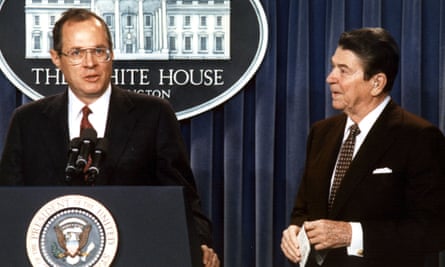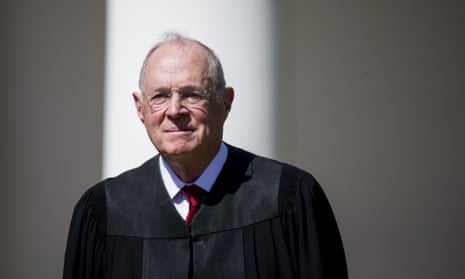The retirement of Anthony Kennedy marks the end of a 30-year career on the US supreme court for a conservative jurist who often found ways to frustrate those on both sides of the aisle.
Since taking his seat, Kennedy has been central in nearly every major case. With the supreme court divided between liberal and conservative factions, Kennedy was considered the wildcard, particularly after the 2006 retirement of Sandra Day O’Connor, the first woman on the bench.
Q&AWho could replace Anthony Kennedy in the supreme court?
Show
Trump has already made public a list of 25 judges he will consider nominating to replace justice Anthony Kennedy when he retires. These are the names at the top of the list.
Brett Kavanaugh, a 53-year-old of the US court of appeals for the DC circuit is a solid front runner.
Thomas Hardiman, 52, was a runner-up for Neil Gorsuch’s supreme court seat in 2017 to replace the late Antonin Scalia before Trump made his pick.
Amy Coney Barrett, 46, was nominated to the US court of appeals for the seventh circuit in May 2017 by Donald Trump.
Amul Thapar, 49, was also appointed by Trump last year and sits on the sixth circuit court of appeals in Kentucky.
William Pryor, 56, was also on Trump’s short-shortlist to replace Antonin Scalia but was beaten to the bench by Neil Gorsuch.
Don Willett, 50, is one of the wilder cards but wouldn’t Trump warm to an outlier and a judge known chiefly outside Texas for his flamboyant use of Twitter?
By Joanna Walters. Read more.
As the court’s “swing vote”, Kennedy played a key role in the move to recognize a constitutional right to same-sex marriage. He wrote the majority opinion in four different landmark cases on gay rights over a two-decade span. He also authored the majority opinion in the Citizens United case, which dismantled campaign finance regulations and opened American politics to the world of big dollar election fund-raising via Super Pacs.
Known for his florid prose in decisions, Kennedy played a key role in framing constitutional law in early 21st century America. He upheld the Roe v Wade case in 1973 that legalized abortion in America, while also supporting state restrictions on abortion rights. And he ruled with the majority in key cases such as Bush v Gore, which settled a recount dispute in Florida’s 2000 presidential election. Kennedy joined in the majority in decisions to expand the right to bear arms, while also writing decisions that limited the scope of the death penalty in the United States. Only hours before announcing his retirement, Kennedy joined the majority in a 5-4 decision to restrict public service unions and overturned a 40-year-old precedent.
His retirement had been a subject of rumors and speculation for years, with new speculation coming earlier this week as the supreme court ended its term.

Born in Sacramento in 1936, Kennedy graduated from Stanford and Harvard Law before returning to his native California to practice law. In 1975, he was appointed to the ninth circuit court of appeals by Gerald Ford and was unanimously confirmed.
Kennedy was Ronald Reagan’s third choice for the supreme court seat vacated by Lewis Powell in 1987. Robert Bork, Reagan’s first choice, was voted down by the United States Senate for his controversial views on civil rights and privacy. Reagan’s second choice, Douglas Ginsburg, withdrew after it was revealed that he had smoked marijuana. Eventually Reagan settled on Kennedy, who was easily confirmed by a margin of 97-0.
Kennedy has also been a leading proponent of the use of international law in US court cases, which has drawn criticism from some conservative legal observers.
